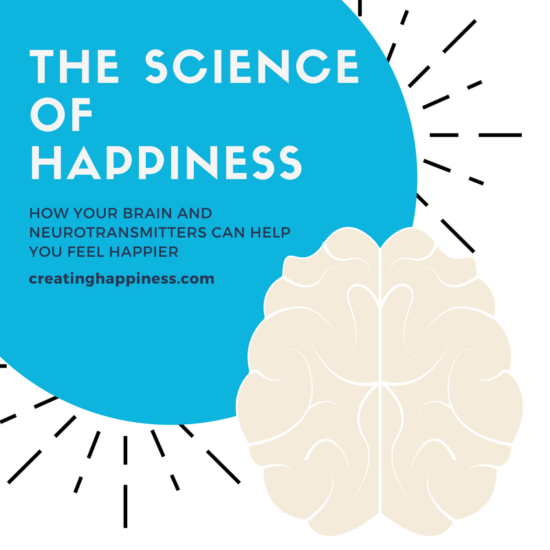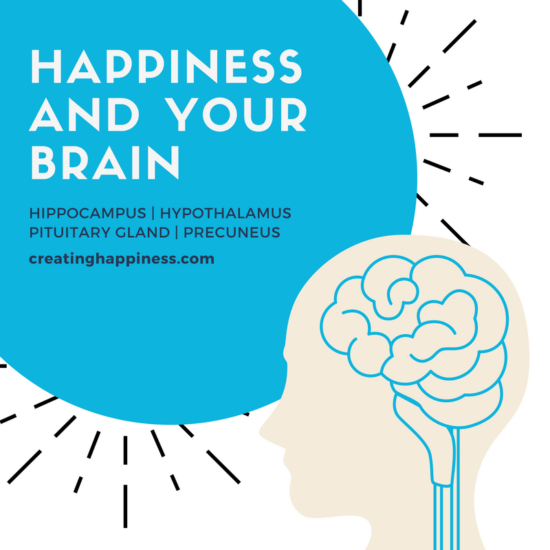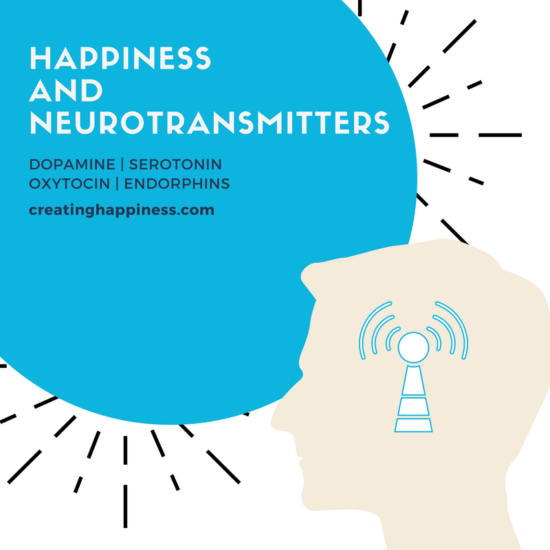Did you know that you can use the power of science to help you with creating happiness? By focusing on the health of four areas of the brain and the levels of four chemicals our body produces, you have greater influence on how you feel.
HAPPINESS AND YOUR BRAIN
The four main areas of the brain that you should be aware of that impact happiness are the Hippocampus, the Hypothalamus, Pituitary Gland and the Precuneus.
HIPPOCAMPUS
The Hippocampus is part of the Limbic system and is associated with emotions, motivation and memory. This area of your brain thrives when you regularly exercise and will grow over time as a result from it.
HYPOTHALAMUS
The Hypothalamus is part of the Endocrine system that regulates your body’s internal balance (homeostasis) and links to the nervous system. This area of your brain thrives when you eat healthy fats, get enough sleep and reduce stress.
PITUITARY GLAND
The Pituitary Gland (known as the “master gland” because it controls so many of the other hormone glands) is also part of the Endocrine system that regulates hormones. This area of your brain needs adequate rest and a healthy, low-glycemic diet consisting of protein and vitamins A, B, D and E. The Pituitary gland is particularly sensitive to diet, so if you are eating processed and unhealthy food, it is likely your Pituitary Gland is not at it’s peak performance.
PRECUNEUS
The Precuneus is located in the right Cerebral Cortex and is where happiness and wellbeing reside. It has been proven to activate when feelings of happiness occur. There is a positive relationship between the size of the Precuneus and the level of happiness. This area in your brain increases in grey matter when you meditate.
HAPPINESS AND NEUROTRANSMITTERS
There are four “happy chemicals” that your body creates to induce feelings of happiness: Dopamine, Serotonin, Oxytocin and Endorphins. Each of these chemicals works as Neurotransmitters.
WHAT IS A NEUROTRANSMITTER?
Neurotransmitters are chemical messengers in your mind that cause emotions. They help the brain to communicate with other parts of the brain and the nervous system.
WHAT ARE SOME SPECIFIC WAYS I CAN HELP MY BODY CREATE THESE “HAPPY CHEMICALS?”
DOPAMINE – THE REWARD CHEMICAL
What is it?
It is a Neurotransmitter that is released by the Hypothalamus in your brain.
How can you improve levels of Dopamine?
Mental: Listen to music or meditate.
Physical: Reduce sugar, caffeine and increase exercise.
Social: Hug more. Human contact increases dopamine. This also applies to cats and dogs…so give more love to the furry friends in your life!
SEROTONIN – THE MOOD REGULATOR
What is it?
It is a Neurotransmitter that is mostly located in blood platelets and is most sensitive to diet.
How can you improve levels of Serotonin?
Mental: Reduce stress. Stress increases Adrenaline and Cortisol, the enemies of serotonin.
Physical: Improve your diet and increase vitamin B6 and soak up some vitamin D from the sun for 20 minutes each day.
Social: Have closer relationships with others. Increased intimacy increases serotonin.
OXYTOCIN – THE LOVE HORMONE
What is it?
It is a hormone released by the Pituitary gland that is a neurotransmitter in the brain.
How can you improve levels of Oxytocin?
Mental: Think positively about yourself and others. Have more positive conversations.
Physical: Sing. Not only does signing lower stress, it soothes your nerves and elevates your spirits.
Social: Connect frequently with others by giving more, touching more and helping others.
ENDORPHINS – THE PAIN KILLER
What is it?
It is a chemical manufactured by your central nervous system (brain, spinal cord and nerves.)
How can you improve levels of Endorphins?
Mental: Laughter induces endorphin release. Watch a funny video, read the funny e-mail, enjoy a silly joke and you’ll release endorphins.
Physical: Exercise. You release endorphins afterwards.
Social: Have more friends. The more friends you have the higher your pain threshold.
Build some time into each day to connect more, move more, laugh more, love more, rest and sleep more and you’ll feel happier in no time!
Further Research Links
Neurochemistry of Positive Conversations




